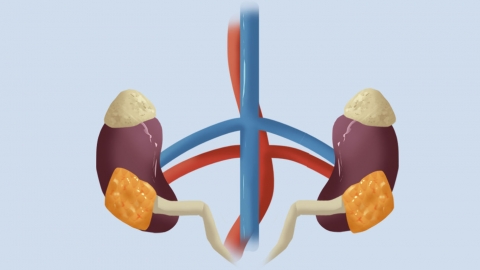What are the causes of elevated urea levels?
Generally, elevated urea levels may be caused by high-protein diets, strenuous exercise, acute glomerulonephritis, chronic pyelonephritis, or chronic renal failure. It is recommended to seek timely medical advice and receive treatment under a doctor's guidance. Detailed explanations are as follows:

1. High-Protein Diet
Consuming excessive protein-rich foods such as meat, legumes, and eggs leads to digestion and metabolism of proteins in the body, ultimately producing urea. Excessive protein intake increases urea production beyond the kidneys' normal excretion capacity, resulting in elevated blood urea levels. It is advisable to maintain a balanced diet with appropriate protein intake based on individual health status and activity level.
2. Strenuous Exercise
During intense physical activity, the body's metabolic rate increases, accelerating protein breakdown in muscle tissues to provide energy. The nitrogen-containing substances generated from this breakdown are metabolized into urea. Post-exercise dehydration may cause blood concentration, thereby increasing the relative urea content per unit volume of blood. It is important to replenish fluids promptly after exercise to maintain the body's water balance.
3. Acute Glomerulonephritis
Acute glomerulonephritis is often triggered by infections with pathogens such as hemolytic streptococcus. The immune response damages the glomeruli, impairing the excretion of metabolic waste products like urea from the bloodstream, thereby causing elevated urea levels. Symptoms may include hematuria, proteinuria, and edema. Patients may use medications such as hydrochlorothiazide tablets, captopril tablets, or penicillin G sodium for injection under medical guidance.
4. Chronic Pyelonephritis
Chronic pyelonephritis may be caused by bacterial infections. Prolonged inflammation damages the renal pelvis and kidney tissue, impairing excretory and reabsorptive functions, which affects urea excretion and leads to elevated levels. Symptoms may include frequent urination, urgency, and dysuria. Patients should use medications such as levofloxacin tablets, cefixime capsules, or amoxicillin capsules under medical advice.
5. Chronic Renal Failure
Chronic renal failure may be associated with chronic kidney diseases such as diabetic nephropathy and hypertensive nephropathy. Progressive destruction of kidney structure and function results in extensive nephron damage, severely reducing the excretion of urea and other metabolic waste products, ultimately leading to significant urea retention in the body. Patients may also experience symptoms such as anemia, electrolyte imbalance, and nausea. Patients should follow medical advice to use medications such as recombinant human erythropoietin injection, benazepril tablets, or furosemide injection. In severe cases, kidney transplantation may be necessary, in which a healthy kidney is transplanted into a patient with kidney failure to achieve therapeutic goals.
It is recommended to undergo regular physical examinations to detect other health-threatening conditions promptly. Additionally, actively manage underlying conditions such as hypertension and diabetes, maintain a healthy lifestyle, quit smoking, limit alcohol consumption, avoid drug abuse, and reduce kidney damage.








